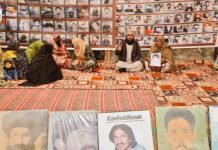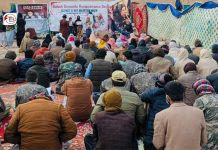According to Baloch YakJehti Committee, or BYC’s Doctor Mahrang Baloch, the International Oppressed Peoples Conference highlights the plight of Balochistan in the global struggle against injustices.
In a powerful address at the International Oppressed Peoples Conference in Islamabad, Dr. Mahrang passionately discussed the grave human rights violations and state violence affecting the Baloch people and other oppressed nations. She said: “Our gathering underscores a shared concern – the violation of fundamental human rights and the prevalence of state violence worldwide. While our focal point involves the challenges faced by the Baloch people, it also extends to a broader context, encapsulating all individuals who find themselves subject to oppression and brutality.”
She further said that over the past 75 years, Balochistan has endured persistent conflict. Regrettably, the resolution of political issues has often been overshadowed by coercive measures such as military interventions, enforced disappearances, extrajudicial killings, forced displacement, collective punishments, and limitations on freedom of expression. This persistent use of force and violence has left an enduring impact on the lives of nearly every citizen in Balochistan.
The Baloch Yakjehti Committee, under Dr. Mahrang’s leadership, has spearheaded a movement transcending regional boundaries. This movement stands as a beacon of hope for the Baloch people and an inspiration for all subjugated nations within the region.
“I urge your undivided attention to convey our people’s pain, suffering, and voice to all of you. When we use the term “Baloch Genocide,” we are often told that it is an exaggerated expression and that there is no genocide in Balochistan. Today, I say to all those that in a region where a graveyard of unknown mutilated bodies is established, where children search for their fathers on the streets instead of attending schools, where hundreds of people are collectively killed, and their mutilated bodies are dumped in mass graves, where women become victims of collective punishment, and 80-year-old mothers protest on the streets awaiting their children forcibly disappeared for 18 years – if all this does not constitute genocide in your eyes, then you need to create a new word in your dictionary for these atrocities,” Dr. Mahrang said while addressing the guests in the conference.
The speech detailed major oppressive incidents in Balochistan, including the discovery of mass graves in the Totak area of Khuzdar district in 2014. Dr. Mahrang passionately described the dire situation faced by the Baloch nation, urging the international community to acknowledge the gravity of the atrocities as a form of genocide.
The forced displacement of thousands of families from their hometowns in Balochistan was another critical issue addressed by Dr. Mahrang. She drew attention to the lack of adequate response from human rights organizations, emphasizing the urgent need to address the plight of these affected people.
The conference also highlighted the stories of families with loved ones who have been victims of forced disappearances and extrajudicial killings. Dr. Mahrang presented the challenges faced by these families, emphasizing the collective suffering endured when a person is forcibly disappeared. She said that here in this conference, there are people whose loved ones were extrajudicially killed. Notable figures like Mama Qadir Baloch, a senior human rights activist, experienced the extrajudicial killing of his son Jalil Rehki after his enforced disappearance. Najma Baloch’s brother, Balach Baloch, faced a similar fate, being extrajudicially killed after his enforced disappearance, even after being presented in court. “I received the mutilated body of my father, Ghaffar Langov, after two years of his enforced disappearance,” Dr. Mahrang said.
She mentioned a detained Pashtun political leader in Pakistan, Manzoor Pashteen who according to her hasbeen continuously and unlawfully detained for the past two months for advocating Pashtun rights.
Dr. Mahrang shed light on other minorities’ plight noting that for the past twenty years, the Hazara community has been facing mass killings based on their religious identity. Sindhis, Muhajirs, and Shias are also experiencing forced disappearances and extrajudicial killings. For decades, Hindu and Christian communities have been facing oppression based on their religious identities. Moreover, even in Punjab today, political activists and journalists have forcibly disappeared based on their political affiliations and freedom of expression.
Yet, today, we stand united with all the ongoing people’s struggles in this region, whether it be the ongoing sit-in in Chaman or the ongoing protest in Gilgit-Baltistan. We stand in solidarity with Muhajirs, Sindhis, Hazaras, Pashtuns, Shias, Hindus, Christians, and all oppressed communities and support their struggle. Moreover, the people of Kurdistan, Palestine, Afghanistan, and many other oppressed communities in the world, Dr Mahrang added.
The role of women in the movements of oppressed nations was acknowledged and praised by Dr. Mahrang. She highlighted the historic contribution of Baloch women in the ongoing struggle against the “Baloch genocide”, emphasizing the need for a collective effort among women from all oppressed nations.
In concluding the address, Dr. Mahrang expressed gratitude to human rights activists and journalists for their constructive role in the movement. She appealed to these individuals and organizations to stand in solidarity with the struggles of oppressed nations worldwide, including the Baloch nation.
The International Oppressed Peoples Conference aimed to serve as a platform to promote unity among oppressed peoples globally and foster solidarity in their struggles. Dr. Mahrang, on behalf of the Baloch Yakjehti Committee, expressed deep gratitude to all participants for their contributions to the success of the conference.




























